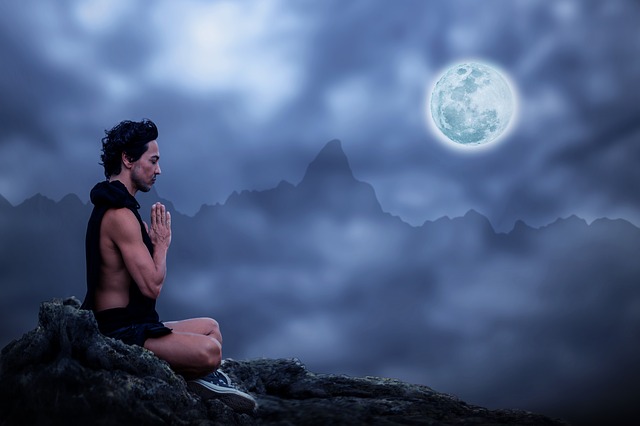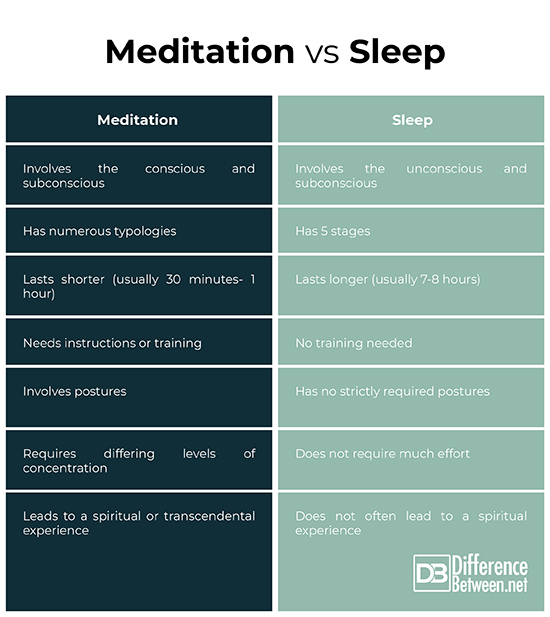Difference Between Meditation and Sleep
Meditation and sleep both involve different stages of consciousness and mostly result to a more relaxed state. This is the reason why some who meditate eventually drift to sleep and that some people who practice regular meditation claim to need less sleeping hours. However, they are perceptibly different as meditation mainly involves the conscious and subconscious minds while sleep chiefly covers the subconscious and unconscious.
What is Meditation?
Meditation came from the Latin word “meditatus” which means “to think” or “to reflect”. It is generally defined as the act of achieving a deeply relaxed state through concentration and breathing. This has been practiced in diverse cultures since antiquity and a number of studies support the claim that medication can reduce anxiety, stress, depression, pain, anger, and other related wellbeing issues. Hence, certain organizations incorporate meditation in their routine to improve the well-being of employees, students, etc.
Since it is influenced by a myriad of traditions and beliefs, meditation has different types and many of them have several subtypes. The following are some of the common kinds:
-
Mindfulness
This can be done almost anywhere as the key practice is to become keenly aware of the environment and one’s sensations and breathing.
-
Loving-Kindness or Metta Meditation
As its name suggests, this type aims to cultivate love and kindness by having an open mind to receive and give such attitudes. Coupled with breathing techniques, the individual repeats the positive message until he escalates his feelings of compassion and love.
-
Progressive Relaxation or Body Scan
Practitioners scan their body (usually from the feet going upwards) and allow tense feelings to be released.
-
Zen
Stemming from Buddhism, this involves certain postures, steps, and spiritual elements. The main objective is to achieve a relaxed position with appropriate breathing and peaceful thinking.
-
Transcendental
By focusing on a mantra, practitioners can rise above their current consciousness to a more spiritual state.
What is Sleep?
Sleep came from the Gothic word “sleps” and Merriam-Webster defines it as “the natural periodic suspension of consciousness”. In this state, almost all voluntary muscles are inhibited which leads to the reduced ability to react to environmental cues. It is recommended to have seven to eight hours of sleep.
A complete sleep cycle takes an average of 90 to 110 minutes. Thus, a person who sleeps for 8 hours will have four to five cycles. This is why you sense yourself being conscious during the transition from NREM (non-rapid eye movement) to REM (rapid eye movement). The following are the five stages of sleep.
-
Stage 1: Light Sleep
This is the transition from consciousness to unconsciousness and the sleeper can easily wake up. Most people experience a falling sensation which is followed by sudden muscular contractions.
-
Stage 2: Preparation for Deep Sleep
Brain waves become slower and the body temperature as well as the heart beat slows down. This is why we feel colder during the deeper stages of sleep.
-
Stage 3: Deep Sleep
Delta waves, very slow brain waves, are alternated with faster but smaller brain waves.
-
Stage 4: Continuation of Deep Sleep or Very Deep Sleep
The brain waves are almost completely delta and if awakened, the person will feel briefly disoriented.
-
Stage 5: REM Sleep
The brain waves resemble those of the wakeful stage and although the eyes are closed, the eyeballs move rapidly from side-to-side, hence, rapid-eye-movement. This is also called the dreaming stage in which intense brain activity occurs.
Difference between Meditation and Sleep
-
Consciousness
Meditation mainly involves the conscious and subconscious mind while sleep chiefly covers the subconscious and unconscious. As compared to sleeping, it is generally easier to shift from a meditative state to normal waking consciousness.
-
Typologies
There are a number of kinds of meditation like mindfulness, body scan, and Zen; many of them have subtypes too. On the other hand, sleep has five stages.
-
Length
It is recommended to have 7-8 hours of sleep each day while meditation can last for a few minutes (usually 30 minutes) and some do it for several hours.
-
Training or Instructions
Practitioners need to follow instructions or have to undergo training before they can master the meditation techniques or steps of a certain type. However, sleep is merely an instinct for the body’s need to rest and recuperate.
-
Posture
Certain postures may be needed for some types such as Zen, Vedic, and Yogic meditations. As for sleep, there are no strictly required postures to achieve it.
-
Concentration
There is much concentration involved in meditation as the practitioner needs to pay attention to his breathing and aim to achieve a distinct cognitive state. On the contrary, sleep just often comes naturally to people with less effort.
-
Spirituality or Transcendental Experience
As compared to sleep, meditation is more associated with a spiritual connection. Those who achieve a very deep meditative state feel an acute sense of inner peace and a vivid connection with the cosmos. Sleep does not give you that kind of feeling.
Meditation vs Sleep
Summary of Meditation vs Sleep
- Meditation and sleep both involve different stages of consciousness and mostly result to a more relaxed state.
- Meditation is generally defined as the act of achieving a deeply relaxed state through concentration and breathing.
- Some types of meditation include mindfulness, zen, body scan, loving kindness, and transcendental.
- Sleep is “the natural periodic suspension of consciousness”.
- Meditation mainly involves the conscious and subconscious mind while sleep chiefly covers the subconscious and unconscious
- Sleep lasts longer than meditation.
- Meditation has numerous types while sleep has 5 stages.
- Meditation involves instructions and postures while sleep has none.
- Meditation requires much concentration as compared to sleep.
- As compared to sleep, meditation is more associated with spiritual or transcendental experience.
- Difference Between Hematoma and Melanoma - February 9, 2023
- Difference Between Bruising and Necrosis - February 8, 2023
- Difference Between Brain Hematoma and Brain Hemorrhage - February 8, 2023
Search DifferenceBetween.net :
Leave a Response
References :
[0]Image credit: https://pixabay.com/en/meditation-man-meditate-rest-yoga-2717462/
[1]Image credit: https://www.publicdomainpictures.net/en/view-image.php?image=208416&picture=sleeping-woman
[2]Germer, Christopher. The mindful path to self-compassion. New York, NY: The Guilford Press, 2009. Print.
[3]Kabat-Zinn, Jon. Falling awake. New York: NY: Hachette Books, 2018. Print.
[4]Stevenson, Shawn. Sleep smarter. New York: NY: Rodale, 2016. Print.



